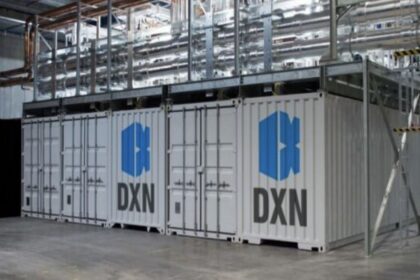Castrol, a leading British industrial lubricant company, has unveiled a groundbreaking product aimed at addressing the escalating thermal demands of modern data centers. The new Castrol ON Direct Liquid Cooling PG 25 is a propylene glycol-based fluid designed for use in direct-to-chip cooling applications. As artificial intelligence (AI) and high-performance computing (HPC) continue to push the limits of processing power, managing heat in data centers has become increasingly critical. Castrol’s solution promises enhanced efficiency and sustainability by offering superior heat management for next-generation processors.
What is Direct-to-Chip Cooling and Why Is It Important?
The Evolution of Cooling in Data Centers
Data centers traditionally rely on air cooling systems to manage the heat generated by servers. However, as computing power increases, especially with AI and machine learning, these air-cooled systems are proving insufficient. Direct-to-chip cooling is an advanced technology that delivers liquid coolant directly to the components that generate heat, such as processors and memory modules. This method offers several advantages over traditional cooling systems, primarily in terms of efficiency and heat management.
How Does Castrol’s Cooling Fluid Improve Performance?
Castrol’s ON Direct Liquid Cooling PG 25 is engineered to maximize heat transfer efficiency. The fluid’s formulation, based on propylene glycol, ensures optimal thermal conductivity, effectively managing the high thermal output of modern processors. This not only improves cooling performance but also reduces the need for energy-intensive air conditioning systems, contributing to energy savings and a lower environmental footprint.
Key Features of Castrol ON Direct Liquid Cooling PG 25
Ready-to-Use and Easy to Implement
One of the standout features of the new Castrol cooling fluid is its ready-to-use formulation. Data center operators can immediately deploy it without the need for additional mixing or preparation. This convenience helps reduce setup time and operational disruptions, allowing data centers to integrate the solution quickly.
Corrosion Protection and Bacterial Growth Inhibition
Another key benefit of Castrol ON Direct Liquid Cooling PG 25 is its built-in protection against corrosion and bacterial growth. These protections are crucial for maintaining the longevity and reliability of cooling systems. By preventing corrosion and microbial contamination, the fluid ensures that the cooling system remains efficient and free from blockages or damage over time.
The Rising Demand for Direct-to-Chip Cooling in Data Centers
How AI and HPC Are Shaping Cooling Needs
As AI and HPC technologies continue to advance, the processing power of servers has increased dramatically. This creates more heat, demanding more sophisticated cooling solutions. According to Castrol, direct-to-chip cooling systems are becoming essential for managing the heat produced by next-generation processors. By providing a direct cooling solution, these systems ensure that components remain within their optimal operating temperature, improving both performance and reliability.
Market Trends and Projections for Direct-to-Chip Cooling
The uptake of direct-to-chip cooling systems has been gradual. A 2023 survey by Uptime revealed that 56% of data center operators were still relying on traditional air cooling systems for their highest-density (40kW and above) cabinets. However, with the increasing power requirements of AI and machine learning workloads, direct-to-chip cooling is projected to displace air cooling technologies over the next decade. Omdia research projects that the global data center cooling market will grow to $16.8 billion by 2028, with direct-to-chip cooling taking a significant share of that market.
Castrol’s Role in the Liquid Cooling Sector
Previous Partnerships and Innovations
Castrol has long been a pioneer in liquid cooling technology, and its latest product further solidifies its position as a leader in this space. Last year, Castrol partnered with Hypertec, a server IT equipment manufacturer, to advance immersion cooling technology. This collaboration has enabled both companies to explore more efficient cooling methods that complement Castrol’s new direct-to-chip cooling fluid.
Additionally, Castrol has committed significant resources to developing innovative cooling solutions. In 2022, the company invested £50 million ($64.55 million) into its headquarters in Pangbourne, UK, to advance immersion fluid development. This investment aims to create next-generation cooling fluids for both direct-to-chip and immersion cooling systems, reinforcing Castrol’s dedication to innovation.
Collaboration with Submer for Immersion Cooling Solutions
Castrol has also formed a strategic partnership with Submer, an immersion cooling expert, to supply and standardize next-generation immersion fluids. Submer’s SmartPods, which utilize immersion cooling technology, benefit from Castrol’s high-performance fluids. This partnership is another example of Castrol’s commitment to addressing the evolving needs of data centers, particularly in high-density environments.
The Future of Data Center Cooling
The Shift Toward Liquid Cooling
As data centers continue to scale to accommodate growing data and compute demands, the shift from traditional air cooling to liquid cooling solutions becomes increasingly inevitable. Direct-to-chip cooling, in particular, offers data center operators a way to manage heat more efficiently and sustainably. With advancements in fluid technology, companies like Castrol are helping to pave the way for the next generation of data center cooling.
Environmental and Efficiency Benefits
One of the primary motivations for adopting direct-to-chip cooling systems is the potential for energy savings. Traditional air cooling systems rely heavily on energy-intensive air conditioning units to regulate temperature. By contrast, liquid cooling methods such as direct-to-chip cooling require less energy, contributing to both operational cost savings and environmental sustainability. As the data center industry becomes more focused on reducing its carbon footprint, liquid cooling solutions are expected to play a crucial role in meeting these objectives.
Castrol’s Leadership in Data Center Cooling
Castrol’s launch of the ON Direct Liquid Cooling PG 25 fluid marks a significant step forward in addressing the thermal challenges faced by modern data centers. By offering superior heat transfer capabilities, corrosion protection, and bacterial growth inhibition, this cooling fluid provides a comprehensive solution for managing the high thermal output of AI and HPC workloads. As the demand for efficient and sustainable cooling solutions grows, Castrol’s innovations will likely continue to shape the future of data center operations.
FAQ Section
What is Castrol ON Direct Liquid Cooling PG 25?
Castrol ON Direct Liquid Cooling PG 25 is a propylene glycol-based cooling fluid designed for direct-to-chip cooling systems in data centers. It offers enhanced thermal management, corrosion protection, and bacterial growth inhibition.
How does direct-to-chip cooling work?
Direct-to-chip cooling systems deliver liquid coolant directly to the components generating heat, such as processors and memory. This results in faster heat transfer and reduces the need for energy-intensive air conditioning systems.
Why is direct-to-chip cooling important for AI and HPC?
AI and HPC workloads generate significant heat, and traditional air cooling systems are often not sufficient to manage this heat. Direct-to-chip cooling offers an efficient solution to ensure optimal performance and prevent overheating.
What are the benefits of using Castrol’s cooling fluid?
Castrol’s cooling fluid offers superior heat transfer, protection against corrosion, and inhibition of bacterial growth. It also reduces the reliance on traditional air conditioning systems, leading to energy savings and a lower environmental impact.
What is the future of data center cooling?
The direct-to-chip cooling market is expected to grow significantly over the next decade, as AI and HPC demand more advanced cooling solutions. Liquid cooling technologies like direct-to-chip cooling are anticipated to replace traditional air cooling methods.



















